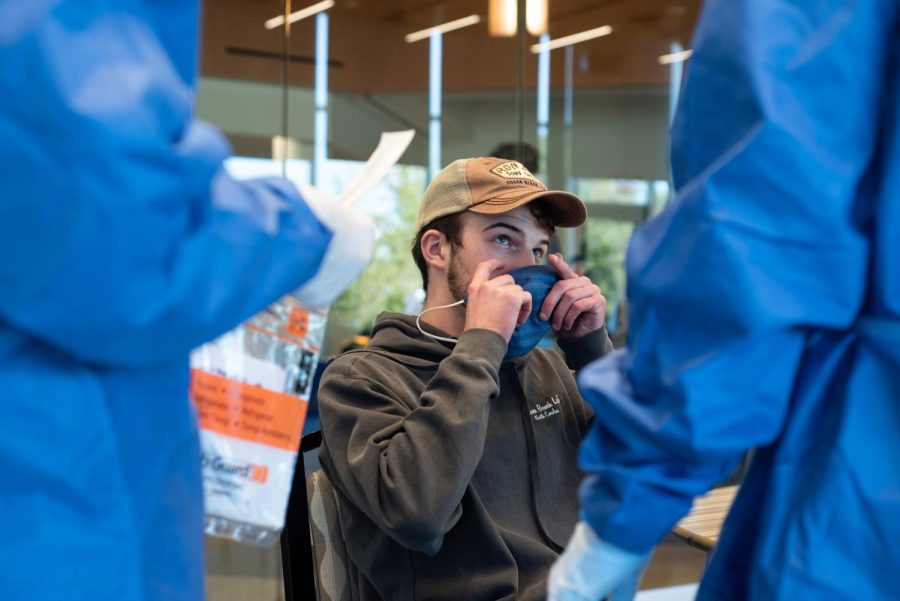Kent State set to begin weekly mass testing
October 8, 2020
In the coming week Kent State is dramatically expanding random COVID-19 testing on campus and will look to test between 400 and 450 individuals a week.
The testing will be carried out in partnership with CVS Pharmacy and will apply to anyone connected to the Kent State main campus, not just students.
Individuals will be selected randomly for testing, but there will be more emphasis placed on certain groups that are at higher risk of exposure.
“We are focusing primarily on populations that have a higher presence on campus,” said Manfred van Dulmen, interim associate provost for Academic Affairs. “Students in the residence halls, students in in-person classes and students with in-person classes that have a higher level of contact (such as labs and clinicals).”
Staff from DeWeese Health Center and CVS will be at the Kiva every weekday starting from “at least” Oct. 12 and running to Nov. 20. CVS will return in the spring to continue to carry out mass testing.
These will be rapid tests, so testees will have their results within 15 minutes. The availability of rapid testing has expanded dramatically in recent months, van Dulmen said.
“Having the ability to get results pretty much in real time is a game changer,” van Dulmen said.
This announcement comes on the heels of an initial mass testing on campus carried out by the Ohio Pandemic Response Team and the National Guard on Friday.
More than 400 individuals were tested and the statistics on the results will be available on Kent State’s COVID-19 dashboard this week, according to the university.
The testing performed on Oct. 2 were not rapid tests and individuals who were tested had to wait until Monday or Tuesday of this week to receive their results.
Rapid testing is much faster, but also less accurate than the polymerase chain reaction (PCR) tests that have been performed on campus up to this point.
“We look for guidance here from our public health experts, our university physician as well as our city and county health commissioners,” van Dulmen said. “And we feel right now the accuracy of the tests we are delivering through CVS is good enough that we can put those in place.”
As well as providing staff for on-campus testing, the university’s partnership with CVS extends to free drive-thru testing at the CVS Pharmacy located near campus for anyone in the community. Appointments can be made through the CVS website.
These will be PCR tests; CVS was provided with a database of individuals connected to Kent State whose test results will be shared with the university and added to the official count on its COVID dashboard.
Additionally, DeWeese Health Center will expand its PCR testing capability.
“We have also scaled up capacity and staffing at the DeWeese Health Center,” van Dulmen said. “So individuals who are asymptomatic and want to get a test at DeWeese can reach out to schedule an appointment.”
At the beginning of the semester, all on-campus testing was carried out at DeWeese, and appointments to receive a test were only offered to those displaying symptoms.
The increase in testing comes as an increasing number of students tested positive for coronavirus, leading to a number of isolations and quarantines on campus.
According to the university dashboard, 165 individuals on Kent’s main campus tested positive since July 7, with 40 new cases since Sept. 27.
101 students are currently under quarantine at Centennial Court A, Centennial Court E, Koonce Hall and Clark Hall. Van Dulmen said it only takes two confirmed cases on a dorm floor or area to institute a quarantine.
This reflects the university and Kent Health Commissioner Joan Seidel’s protocols for preventing spread early before larger outbreaks begin.
Seidel is the one who actually has the authority to issue quarantines on campus.
“Our strategy has really been to take preventative measures,” van Dulmen said. “The approach really has been when we see sparks, we want to make sure they don’t become flames. (A quarantine) doesn’t mean by default that there are widespread positive tests. It only takes a few.”
Owen is a sports editor. Contact him at [email protected].
SUPPORT STUDENT MEDIA
Hi, I’m Lauren Sasala, a senior journalism student from Toledo. I’m also the editor in chief of The Kent Stater and KentWired this semester. My staff and I are committed to bringing you the most important news about Kent State and the Kent community. We are full-time students and hard-working journalists. While we get support from the student media fee and earned revenue such as advertising, both of those continue to decline. Your generous gift of any amount will help enhance our student experience as we grow into working professionals. Please go here to donate.

























